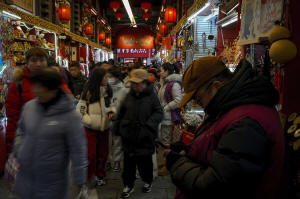Beijing's deflation dilemma: Falling prices signal bigger troubles ahead
for China's economy
[March 04, 2025] By
SIMINA MISTREANU
BEIJING (AP) — When he bought an apartment near a good high school in
northeast Beijing in 2020, Zhou Fujin expected that renting it out would
cover most of his mortgage. But the apartment's value and the rent he is
getting have plummeted in the past couple years, straining his family’s
finances.
China is experiencing a spell of deflation, or falling prices, that
contrasts with inflationary pressures prevailing elsewhere in the world.
Cheaper prices can be a blessing for some, but deflation is a symptom of
relatively weak demand and stalling economic growth.
Such challenges are the backdrop to the annual session of China's
parliament, which begins Wednesday. It's unclear what the ruling
Communist Party might do to tackle the problem, though some economists
expect more government spending. Observers also will be watching for
changes to the annual economic growth target, which has hovered near 5%
for the past two years.
These are broad, long-term problems. Falling housing prices have left
many families reluctant to spend, while factories keep churning out
goods.
Economy-wide, prices fell in 2023 and 2024, the longest bout of
deflation since the 1960s. The gross domestic product deflator –- the
broadest measure of price changes in an economy -– dipped to -0.8% in
the last three months of 2024, compared to -0.5% the quarter before,
meaning that deflation has intensified.

Tightened purse strings
Deflation is an abstract economic concept but it reflects very
concretely in Zhou’s personal balance sheet, as it does for millions of
others. Zhou’s apartment, in Beijing’s Miyun district, cost 2 million
yuan ($275,000) when he bought it in 2020, and he financed it with an
800,000 yuan ($110,000) bank loan. The rent he charges has fallen from
2,300 yuan ($316) monthly to 1,700 yuan ($234). His monthly mortgage
payment is more than 3,000 yuan ($413), and the apartment is now worth
only about 1.4 million yuan ($193,000), he says.
Around the time Zhou bought his apartment, the government began cracking
down on excess borrowing by real estate developers, pushing the industry
into crisis and many property companies into default. The father of two
runs a real estate brokerage firm, which has been hemorrhaging money
over the past four years. He has since expanded into home decoration
services, helping him to break even.
“Given that I work in the real estate sector, my income has been greatly
affected,” Zhou told The Associated Press. “My biggest spending is on
bank mortgages, my car and my children's education. I've cut other
expenditures such as travel. Even my children have realized that money
is not easy to earn, and they are willing to spend less.”
Lu Wanyong, who owns a picture framing workshop in Beijing, says he gets
only one or two customers a day, down from more than a dozen before the
pandemic. Many now prefer to fix broken picture frames rather than buy
new ones. Fewer new homeowners come in looking to decorate their
apartments.
Lu’s family has burned through its savings and he fears that soon he
won’t be able to pay his shop’s 6,000 yuan ($825) rent.
“I am considering shifting to other industries, but the problem is that
I am not familiar with any of them. And as a matter of fact, which
industry is easy to work in nowadays?” he pondered.
A ‘deflationary spiral’ can signal bigger trouble ahead
Deflation can be harder for governments to tackle than inflation,
experts say, because that requires fixing the underlying issues behind
it.
In China’s case, it’s a combination of excess capacity — manufactured
goods produced in such quantities the market cannot absorb them all -–
and the reluctance of consumers to spend and businesses to invest, due
to concerns about the sluggish economy. Also, the housing crisis has
wiped out an estimated $18 trillion of household wealth, according to a
Barclays report, on top of job losses due to the COVID-19 pandemic.
[to top of second column] |

A cook takes a smoke break outside a restaurant in Beijing, on Feb.
26, 2025. (AP Photo/Ng Han Guan)

“When the real estate market is booming, people believe that they are
very rich,” said He-Ling Shi, an associate professor of economics at
Australia's Monash University. “If people believe that they’re rich,
they tend to spend their income on consumption. But with the decrease in
the price of housing in most parts of China, people believe that they’re
no longer as rich as before, so … they want to increase their savings
and reduce their consumption.”
When prices fall, companies' profits also take a hit. That can spur a
so-called “deflationary spiral” of layoffs that further reduce household
incomes, leading to even less consumption and potentially to a recession
or depression. Fitch Ratings in November warned that deflation is
becoming entrenched in China and urged its leaders to adopt policies
that can boost demand.
Meanwhile, U.S. President Donald Trump has imposed new 20% tariffs on
Chinese exports that are expected to shave up to 1.1 percentage points
off China’s GDP growth this year in a “severe scenario” where Chinese
exports to the U.S. fall by half, said Erica Tay, director of macro
research at Maybank Investment Banking Group.
A sensitive issue for the Communist Party
Deflation is a ticklish issue for China’s leaders, who began cutting
interest rates and required mortgage down-payments last fall. They have
launched programs to get local governments to buy unsold apartments to
rent out as affordable housing and are encouraging banks to lend more
money.
But top leaders tend to focus their public comments on the ruling
party's accomplishments and avoid directly mentioning deflation, a
thorny problem with no quick fixes.
“They try to do their best to avoid the word ‘deflation’ because they
believe that will make consumers even more panicked,” Shi said. “If they
become more panicked, they will further reduce their consumption and
therefore make the situation worse.”
Some economists, including Michael Pettis, a professor of finance at
Guanghua School of Management at Peking University, say the economy can
only be rebalanced if consumers gain purchasing power. That requires
reducing the share of wealth going into unproductive investments.

The government has sought to encourage more spending by issuing
vouchers, while shying away from more fundamental economic reforms.
“Economic recovery should be linked to a rise in people’s incomes” said
Sun Lijian, professor at the School of Economics at Fudan University.
“The government should provide vouchers to help people purchase what
they need; this has proven to be an effective way.”
Louis Kuijs, chief Asia economist for S&P Global Ratings, says China
needs to address long-term, chronic problems including excess industrial
production and inefficient state industries. Revamping health care,
pensions and education systems would make people “more comfortable about
their financial situation.”
“In the short term, simply anything that increases household incomes
will help on the consumption side,” Kuijs said, “but probably more
importantly is that structural reform element … and that requires
beefing up of the government’s role in health, education and social
security.”
___
Associated Press researcher Yu Bing contributed to this report.
All contents © copyright 2025 Associated Press. All rights reserved |